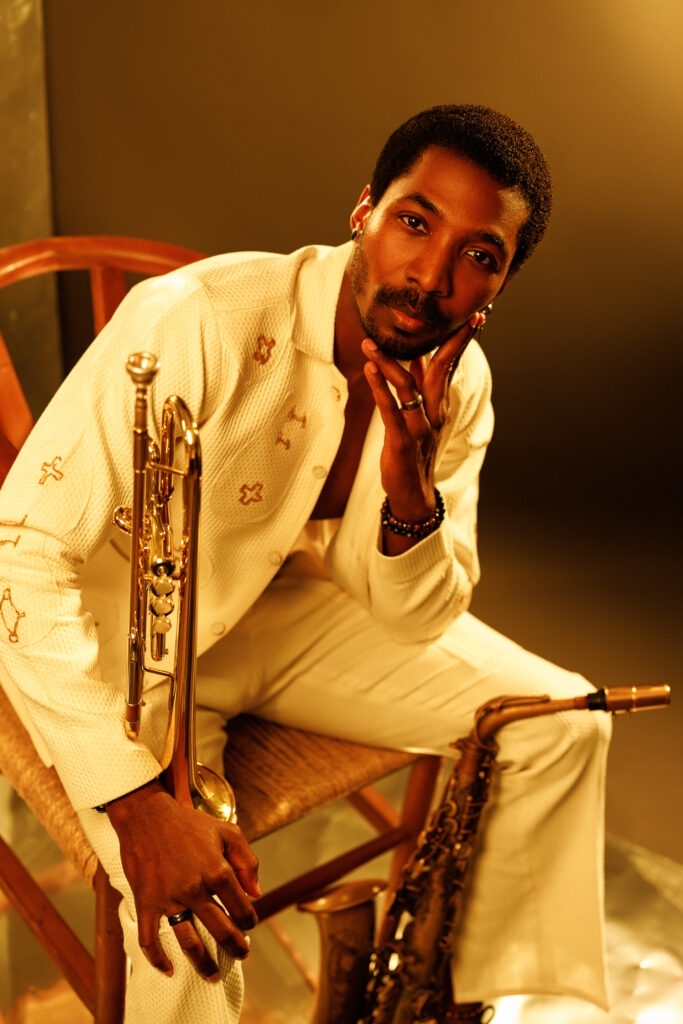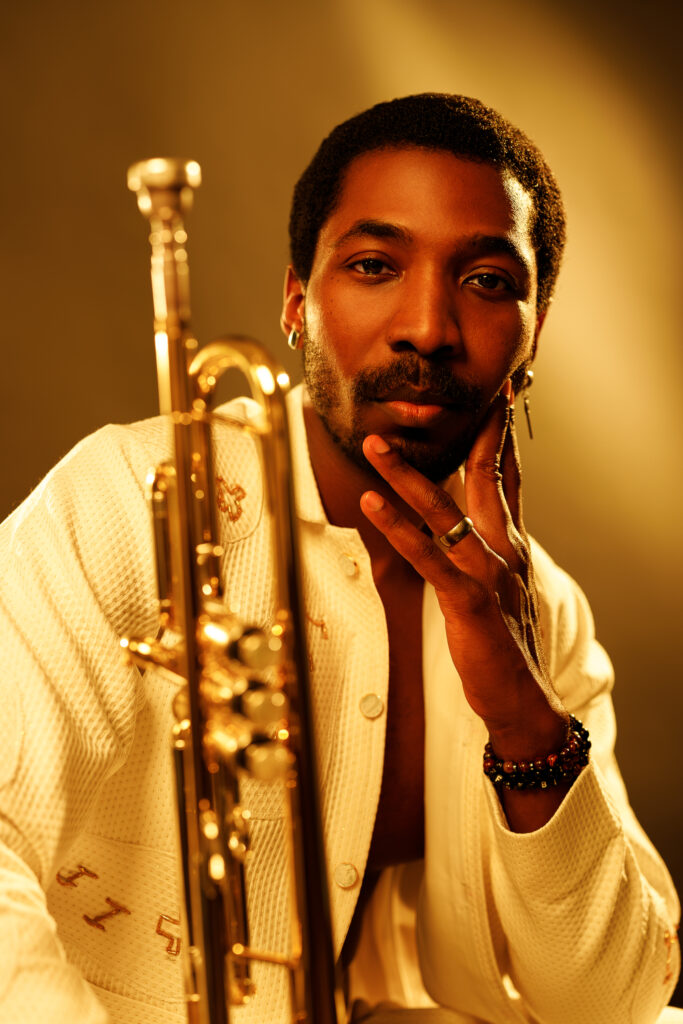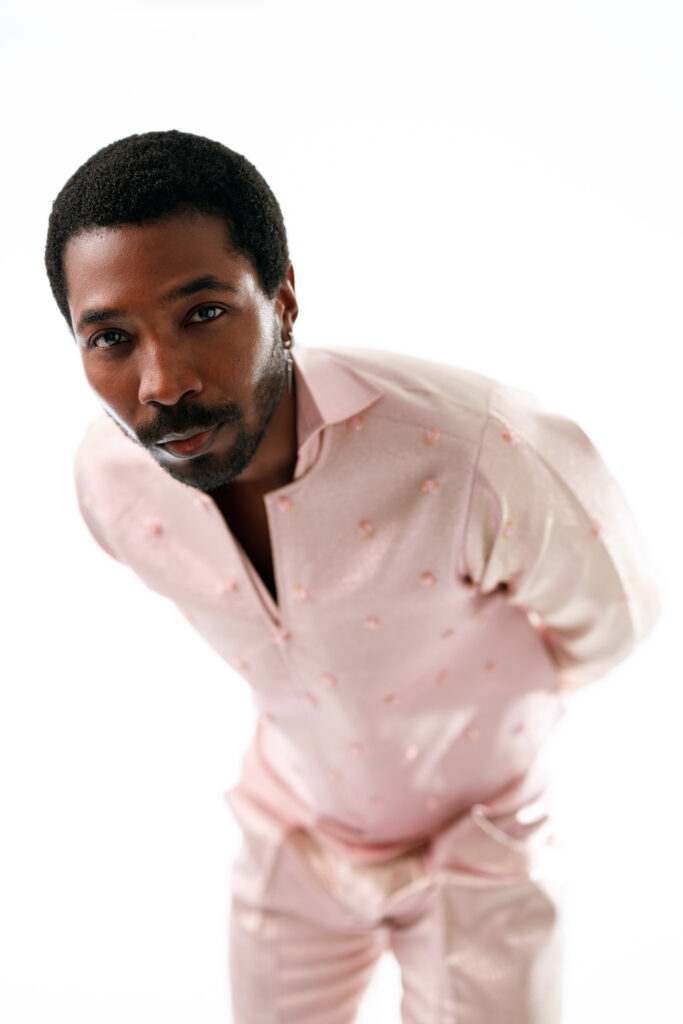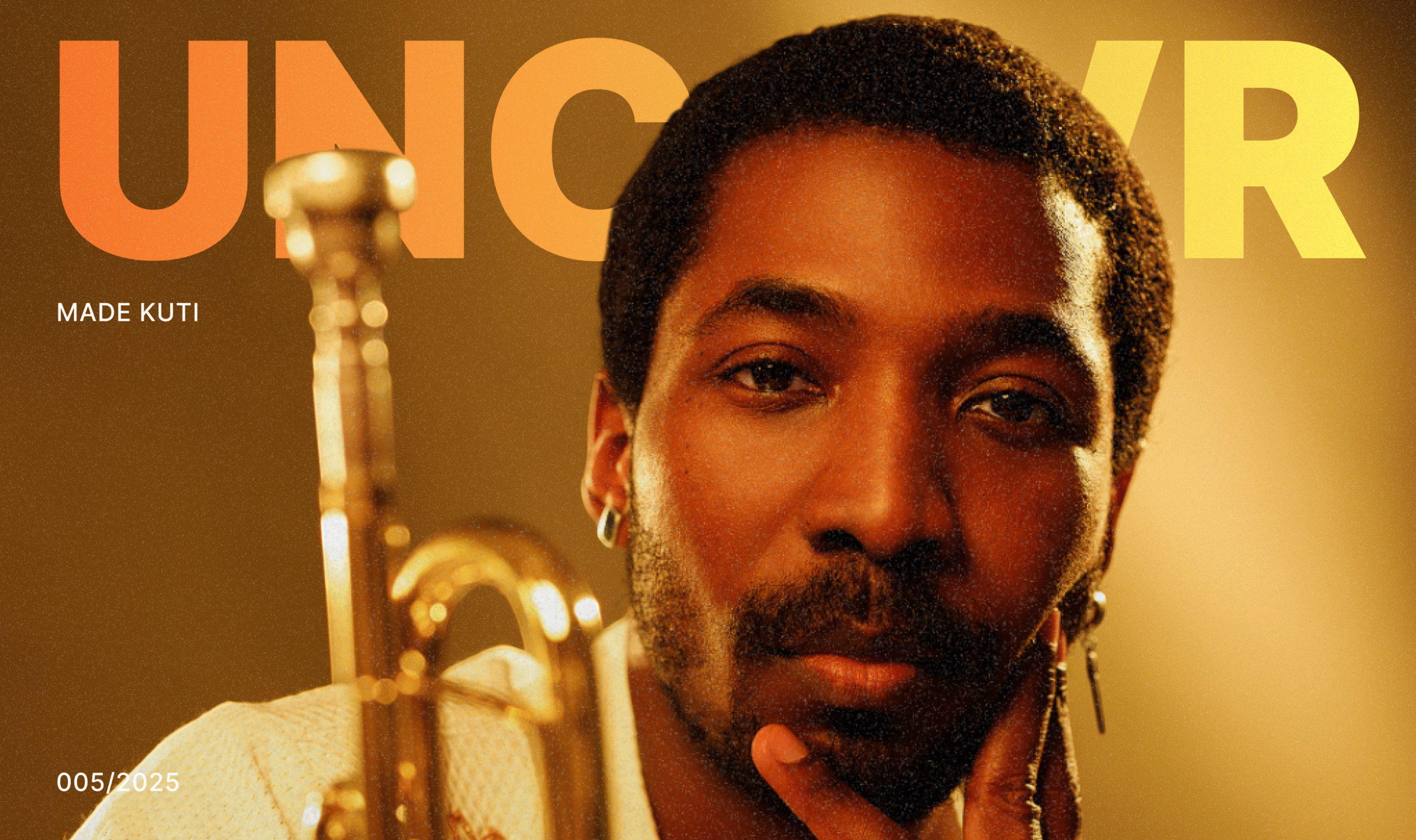When you hear the surname Kuti attached to a musician, it’s almost instinctive to think of the legendary Fela Kuti — and you wouldn’t be wrong. After Fela, his sons carried the flame, keeping his legacy alive. Now, a new generation has stepped forward: his grandson, Made Kuti, who isn’t just inheriting the fire but igniting a torch of his own.
With music in his veins, he is carving out a distinct path and building his own influence. As he puts it, he isn’t trying to be a replica of his father or grandfather — he’s defining himself on his own terms. “It is easier to be yourself than to be a copy of someone.” Being himself is what brings out his divine creativity.
He recalls he didn’t feel any weight to be a musician, but rather, he found a natural interest in musical instruments. “The sax? It was me who said, ‘Daddy, I really like this instrument, can I learn how to play it?’ Same thing with the trumpet, same thing with the drum, same thing with the guitar, and then I just knew that I wanted to study music at a higher level of learning, at university.”
His curiosity about different instruments soon blossomed into something remarkable. By embracing the history and legacy of his father’s and grandfather’s music, he was able to shape his own path. Along the way, he picked up the bass — a discovery that even caught his father by surprise.
While on tour in New York, his father’s bassist suddenly quit the band. Later, during a European tour, his father visited his school and was astonished to learn of his hidden skill. “Ahhh ah, Made, you can play the bass? Okay, I need you to learn these tracks — you’re going to play in my band, if you don’t mind,” he exclaimed. And just like that, Made stepped into the band, ready to rise to the occasion.
For Made Kuti, who is a Grammy-nominated musician and composer, you might wonder how he puts sounds together. “It’s very rare that lyrics come first for me; it’s usually a musical idea. And when lyrics come first, it tends to be on a song like I Won’t Run Away.” Made Kuti believes that the tracks in his discography have different colours and are unique. “I Won’t Run Away feels like sunset orange, whereas Take It All In Before The Lights Go Out is a splatter of colours, and Story feels like navy blue, dark night sky blue. It really depends on the track.”
With his new album, Chapter 1: Where Does Happiness Come From?, he remains true to himself. He revealed that some of the tracks were made three years ago. What he challenged through this album is the individual, making us all accountable for everything happening to us as persons, a community, and a country.
He shared personal experiences, such as watching some of his father’s band members run away once they landed in a foreign country for a show. “We’ve learned from so many years of just plain and clear abuse of power and it has trickled down into the mind of an average Nigerian, where the average Nigerian can be on the road (overseas) with a musician that has given him everything (needed).


Then they believe it is within their right to run away on tour, because they’re looking for greener pasture and don’t want to return back home, regardless of the consequences of their actions. Because, in the future, it will be challenging for me, as a musician, to obtain visas for my band, and this is a consistent problem…and it tells a lot about the state of mind of the average Nigerian.
So my music is just about being a better person, really challenging yourself, and asking if you are really part of the solution. If you’re in the position that the leaders are in, will you be any different? Are you better than the people you judge? So, look inside, face all the ugly and the dirty. That’s it. I was just writing music that was different from the direction, because I feel that if everyone plays their part, the world will be a better place.”
On the track Story, two generations of the Kuti family come together for the first time on a song. It’s within its lyrics that the central question — Where Does Happiness Come From? — emerges, giving the project its title.
The album cover, created by his cousin, Yeni Kuti’s daughter, perfectly fits all the songs on the album. “(In the cover) I wanted it to be a person, but my management insisted that it should be me, since it was my sophomore album. Still, I wanted it to represent what I wanted: it’s a person by himself in the middle of sort of nowhere. They know where they are, but the place itself is not meaningful. There is water, there is sky, and land behind. It is pretty, but the person is not doing anything except being introspective.”
The familial collaboration did not stop there; Made Kuti shared the microphone with his dad, Femi Kuti, for the first time ever on the penultimate track, Story.
Although Nigerian music is reaching the entire world, Made Kuti fears that the musical structure in Nigeria is not getting better. He points out that many fundamental things are not in place, from standard musical venues to music instrument shops.
“I fear the absence of live performances. I think in Lagos, there are only two real musical venues that are dedicated to music, and I think it’s the Shrine and Freedom Park; no other place comes to mind.”
For a country that is exporting some of the best music heard in the world, its live performance scene is poor. “A lot of it seems to be happening internationally.”


Made Kuti strongly believes that there needs to be an equal balance between commercial and conscious music emerging from the country. “It’s okay for club music to exist, you know, music that’s for enjoying, that’s for love, music that’s about money, it’s perfectly natural for that.” But he also has a fear: “What I fear is that it becomes the sole format and the sole sort of exports’ because, at the end of the day, music is the weapon of the future and very spiritual. Music has so much power, so I feel that we need to hold this power responsibly.”
Outside of music, Made Kuti is kind of an introvert; he enjoys his time indoors. But when it’s time to chill and relax (other than at his house), his favourite spot is the New African Shrine. He is also an elder brother to six siblings, a husband, a first son, a gamer, and a sportsman who enjoys swimming and football.
He is a reader and an OG Otaku fan, which is also why he finds it hard to choose a top 10 favourite anime—he can actually think of a top 15, including the likes of Code Geass, Fullmetal Alchemist: Brotherhood, and One Piece. When I asked him if he thinks they will find the One Piece soon, he said, “I would hate to die without knowing what it is…cause I have waited a long time,” he laughed. Attack on Titan is also one of his favourites: “It is phenomenal.”
Made Kuti’s life is really peaceful and calm, and what he really sees as success goes beyond the charts, recognition, and awards. “As long as I can be happy with what I’ve done, the projects I have made, the stages I performed at. I am happy. And I’m also happy if I can pass positive influence and enlighten people with my music, because it comes from a very true place.”
As the musical fanatic that Made Kuti is, he would love to travel back in time to watch Fela Kuti record an album, and John Coltrane. “I’d like to be there for those inedible recording sessions. There was a track that Fela said take one and confessed it wasn’t really the first take. I’d have loved to be in the room to experience these recordings.” And when asked to describe his new album in three words, he said, “introspective, energetic, and musical.”
For Made Kuti, he really enjoys writing his music, composing and arranging it. “I’m very proud of these projects (For(e)ward and Chapter 1: Where Does Happiness Come From). I’m very, very excited because it’s giving me a lot of ideas for chapter 2, but I’m very, very proud of it.”
As much as his songs are made for many reasons, they are all made for the stage, and he is looking forward to making more albums and chapters as long as he is alive. And when asked what his favourite song on his playlist is right now, he says, “I started listening to Fefe Na Efe by Fela. The music is so cool. And oh, I’m listening to a bit of Akala, Mendelssohn, Erik Satie, PJ Morton, some rock stuff, some Latin stuff, Soil & Pimp Sessions, and OG American stuff as well: Gil Scott-Heron and OutKast.”
Made Kuti is more than a keeper of the family flame — he is a builder of his own legacy, one album, one stage, and one thoughtful note at a time. Grounded in history yet reaching toward the future, his music asks questions that linger long after the last chord fades. With each new chapter, he proves that the Kuti legacy isn’t just alive, it’s evolving — and the world should be paying attention.





